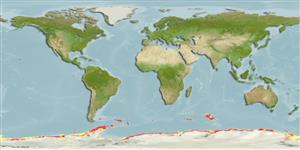>
Perciformes/Notothenioidei (Icefishes) >
Nototheniidae (Cod icefishes) > Nototheniinae
Etymology: Notothenia: Greek, 'notos', ou; νοτος, ου), from the south + Greek, 'e 'eutheneia',as or 'euthenia', as (ευθενεια, ας; ευθενια, ας), abundance (P. Romero, pers.comm. 01/16); coriiceps: coriiceps from Latin corium skin or leather plus ceps head = skin head or leather head (Ref. 11892).
More on author: Richardson.
Environment: milieu / climate zone / depth range / distribution range
Ecologia
marinhas demersal; intervalo de profundidade 0 - 550 m. Polar; 46°S - 78°S, 180°W - 180°E
Southern Ocean: probably circum-Antarctic on the continental shelf. So far, known from the western Ross Sea, Balleny islands, Adélie Land, Antarctic Peninsula and associated islands, islands of the Scotia Arc to South Georgia, Weddell Sea, Bouvet, and the sub-Antarctic islands of the Indian Ocean sector.
Length at first maturity / Tamanho / Peso / Idade
Maturity: Lm 36.5 range ? - ? cm
Max length : 62.0 cm TL macho/indeterminado; (Ref. 5179); common length : 50.0 cm TL macho/indeterminado; (Ref. 2121)
Descrição breve
Chaves de identificação | Morfologia | Morfometria
Espinhos dorsais (total) : 4 - 6; Raios dorsais moles (total) : 35 - 38; Raios anais moles: 26 - 30. Wide interorbital space, fewer pectoral rays, lack of scales below the eye (Ref. 11892).
Most commonly found in less than 200 m (Re. 5179). Stomach contents included
mainly small crustaceans (Amphipoda and Euphausiacea) and seaweeds (Ref. 122792).
Dewitt, H.H., P.C. Heemstra and O. Gon, 1990. Nototheniidae. p. 279-331. In O. Gon and P.C. Heemstra (eds.) Fishes of the Southern Ocean. J.L.B. Smith Institute of Ichthyology, Grahamstown, South Africa. (Ref. 5179)
Categoria na Lista Vermelha da IUCN (Ref. 130435: Version 2024-1)
Ameaça para o homem
Harmless
Utilização humana
Pescarias: de interesse potencial
Ferramentas
Relatórios especiais
Descarregue XML
Fontes da internet
Estimates based on models
Preferred temperature (Ref.
123201): -1.7 - 2.4, mean -0.6 °C (based on 170 cells).
Phylogenetic diversity index (Ref.
82804): PD
50 = 0.5078 [Uniqueness, from 0.5 = low to 2.0 = high].
Bayesian length-weight: a=0.00661 (0.00543 - 0.00804), b=3.22 (3.16 - 3.28), in cm total length, based on LWR estimates for this species (Ref.
93245).
Nível Trófico (Ref.
69278): 2.8 ±0.35 se; based on food items.
Resiliência (Ref.
120179): Baixo, tempo mínimo de duplicação da população 4,5 - 14 anos (Assuming tm>4).
Fishing Vulnerability (Ref.
59153): High vulnerability (60 of 100).
Climate Vulnerability (Ref.
125649): Moderate to high vulnerability (50 of 100).
Nutrients (Ref.
124155): Calcium = 20.8 [12.1, 47.6] mg/100g; Iron = 0.412 [0.189, 0.797] mg/100g; Protein = 18 [16, 20] %; Omega3 = 0.326 [0.178, 0.568] g/100g; Selenium = 18.9 [7.9, 43.2] μg/100g; VitaminA = 9.04 [2.05, 41.45] μg/100g; Zinc = 0.491 [0.330, 0.740] mg/100g (wet weight);
